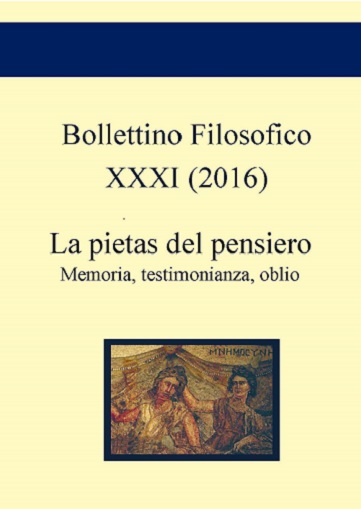Tra Memoria e Oblio. Antropologia e Storia
Abstract
Starting from J.P. Ricoeur’s book La mémoire, l’histoire, l’oubli I reflect on the meaning of history. Because history deals with the human beings’ events, I propose to analyse the human being in itself and in relationship with others, particularly regarding the difficult question of "time". Husserl’s phenomenological anthropology permits the description of the phenomenon of time and the reasons of remembering and forgetting when one reconstructs what happens in the past. Psychic and intellectual aspects (i.e. hyletics and noetics) of the human being are involved in the way in which the events are told. Husserl enters in the same field analysed by Freud giving his own interpretation of memory and oblivion. In this sense time, as past, present and future, and history are deeply interconnected, but memory of the past in itself is not sufficient to understand contemporary historiography, as Ricoeur underscores, it needs documents as substitutes of lived memory.
Downloads
Bollettino Filosofico pubblica in internet, ad accesso aperto, con licenza:
|
|
CCPL Creative Commons Attribution |
L'autore conserva il copyright sul suo contributo, consentendo tuttavia a chiunque "di riprodurre, distribuire, comunicare al pubblico, esporre in pubblico, rappresentare, eseguire e recitare l'opera", purché siano correttamente citati l'autore e il titolo della rivista. L’autore, al momento della proposta di pubblicazione, è inoltre tenuto a dichiarare che il contenuto e l’organizzazione dell’opera è originale e non compromette in alcun modo i diritti di terzi, né gli obblighi connessi alla salvaguardia di diritti morali ed economici di altri autori o di altri aventi diritto, sia per testi, immagini, foto, tabelle, sia per altre parti di cui il contributo può essere composto. L’autore dichiara altresì di essere a conoscenza delle sanzioni previste dal codice penale e dalle leggi speciali per l’ipotesi di falsità in atti ed uso di atti falsi, e che pertanto Bollettino Filosofico è esente da qualsiasi responsabilità di qualsivoglia natura, civile, amministrativa o penale, e sarà dall'autore tenuta indenne da qualsiasi richiesta o rivendicazione da parte di terzi.
